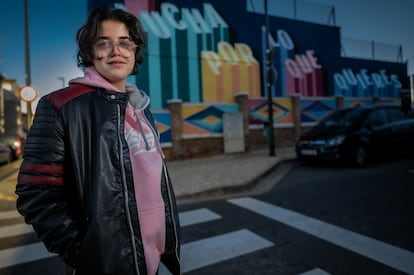Call me by my name: The challenge for trans students in Spanish classrooms
Most schools support the transitioning process, but there are still pockets of resistance and a lack of unified regulations


As a trans student in Zaragoza, Rüdiger Velasco, 14, had a hard time before finally finding the safe and supportive school environment he enjoys today. “I was bullied at a school run by the Claretian Sisters and the teachers did nothing, not even the principal,” he says. “Then at Miralbueno High School, I had an ultra-transphobic teacher and that led to insults and physical aggression. I told him eight times to call me by my name, but he deliberately wouldn’t do so.” For trans children, being called by their new name is a decisive moment. Velasco found it difficult to get teachers to respect him even though he was protected by existing regulations.
Increasingly, Velasco’s experience is the exception and not the rule, according to parents’ associations of transgender children. The vast majority of students are supported by their peers, teachers and school principals when they transition. But there is still work to be done to protect these kids from harassment and discrimination, and to homogenize regional regulations. The protocols within educational centers adopted by 14 of Spain’s autonomous regions oblige schools to respect a child’s wishes when it comes to their name. Only Asturias, La Rioja and Castilla y León lack a regulation in this respect, though the latter region is now in the process of drafting one.
You don’t have to understand anything, just respect and accept itMaría Jesús Durán, mother of a trans child
Andalusia’s transsexuality legislation has included a protocol on the use of students’ preferred names since 2014, but as some schools were ignoring transitioning students’ wishes when interpreting the legislation, the regional government – a coalition of the conservative Popular Party (PP) and the liberal Ciudadanos (Citizens) – settled the matter several weeks ago by adding a “temporary gender identity” tab to its computer system.
A mother from the southern province of Almeria who prefers to remain anonymous recounts her son’s ordeal. “The name is so important at the beginning because it is the only thing they have and it identifies them,” she says. “It is more important than people think, because at that age they don’t usually get hormone treatment. When a new teacher named my son in the feminine form, it was a huge humiliation and exposure for him, and I would pick him up after school in tears.” The school board made a move to address the issue after the family association Chrysallis asked the Andalusian Ombudsman for Minors, Jesús Maeztu, for protection.
In the last two decades, families of transgender children have ditched conservative attitudes to embrace their children. But it has only been in the last 10 years that Spain’s regions have legislated to protect these minors from harassment and ensure their transition is respected. At the end of the 20th century, the transition was often postponed until adulthood, which meant many youngsters were forced to suffer in silence. Now the change of name on a child’s healthcare card is generally straightforward, while a request must be made to the courts regarding a change to their national identity card (DNI), with the judge generally ruling in their favor.
What is shocking is that there is no centralized regulatory framework, meaning that there are different rights for trans children depending on where they were bornIsidro García, sexologist
Jesús Generelo, former president of the State Federation of Lesbian, Gay, Trans and Bisexual People (FELGTB), sees the school environment for transgender students as a lottery. “Even the regions with regulations and protocols depend on the goodwill of the school,” he says. “The adoption of the rules is very slow. If families do not mobilize and stand up for themselves, there is no guarantee that their rights will be respected.” Generelo recently carried out a survey of 73 transgender minors and he highlights the “very high” levels of harassment they are subjected to, with the risk of suicide being three times greater than with the average teenager.
Asked if they were called by their chosen name in oral communication at school, 27% of the children answered “never” and 26% “rarely.” Asked whether their chosen name was respected in documents, 39% answered “never” and 27% “rarely.” As many as 58% of the transgender students had suffered transphobia; in half these cases, the school did nothing to support them while only 57% had help, thanks to the protocols put in place.
Rüdiger’s mother, Nuria Vázquez, who received support from the Euforia association, claims that her son’s first school, María Inmaculada Misioneras Claretianas, drew up a psychological-pedagogical report on her child without examining him. The document reads: “It is rather the student who does not normalize his situation. He is treated by everyone as a boy and it is he who emphasizes that he is transsexual.” School principal Beatriz Tena, who was also one of Rüdiguer’s teachers, denies that he was not interviewed for the report. “We were very understanding with Rüdi and his classmates accepted him with absolute normality, except for a few that he had run-ins with,” she says.
According to the sexologist and social worker Isidro García, who has 16 years of experience working with minors, “what is shocking is that there is no centralized regulatory framework, meaning that there are different rights for trans children depending on where they were born, despite the fact that the Spanish Constitution guarantees equality for everyone. The protection of minors is the obligation of the state, of citizens and of families.” García points out that no one chooses their gender identity, they discover it, and it may take more or less time, but that information is vital. “If families do not have information, it may lead to transphobic attitudes and endanger their [the child’s] mental and physical health,” he adds.
In Almería province, most schools have respected the wishes of their trans students and changed their names, but some inspectors and school principals have considered that first there must be a change in the civil registry records authorized by a judge. Inspector Manuel Rodríguez believes that they have acted in accordance with the norm. “I am totally sensitive to the issue, but school principals who change the official documents of the student body without a court order are not acting in accordance with protocol,” he says.
The experience of Eider, a non-binary trans minor from Seville, is representative of the majority of cases, with classroom peers generally normalizing identity changes faster than adults. Eider’s mother, María Jesús Durán, recalls her child’s attitude during the coronavirus lockdown. “They started to feel things leading them to delete me from Tik Tok [a social network] so they could express what they felt. Now they are back to being simpátique [sic] and being the person they were and accepting their body – they don’t need to take hormones. You don’t have to understand anything, just respect and accept it.”
English version by Heather Galloway.
Tu suscripción se está usando en otro dispositivo
¿Quieres añadir otro usuario a tu suscripción?
Si continúas leyendo en este dispositivo, no se podrá leer en el otro.
FlechaTu suscripción se está usando en otro dispositivo y solo puedes acceder a EL PAÍS desde un dispositivo a la vez.
Si quieres compartir tu cuenta, cambia tu suscripción a la modalidad Premium, así podrás añadir otro usuario. Cada uno accederá con su propia cuenta de email, lo que os permitirá personalizar vuestra experiencia en EL PAÍS.
¿Tienes una suscripción de empresa? Accede aquí para contratar más cuentas.
En el caso de no saber quién está usando tu cuenta, te recomendamos cambiar tu contraseña aquí.
Si decides continuar compartiendo tu cuenta, este mensaje se mostrará en tu dispositivo y en el de la otra persona que está usando tu cuenta de forma indefinida, afectando a tu experiencia de lectura. Puedes consultar aquí los términos y condiciones de la suscripción digital.








































